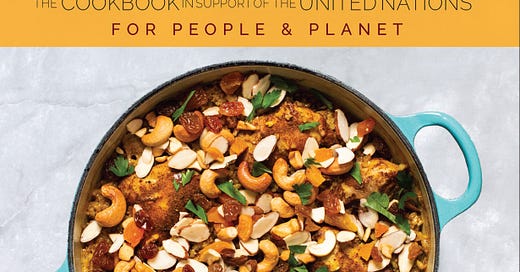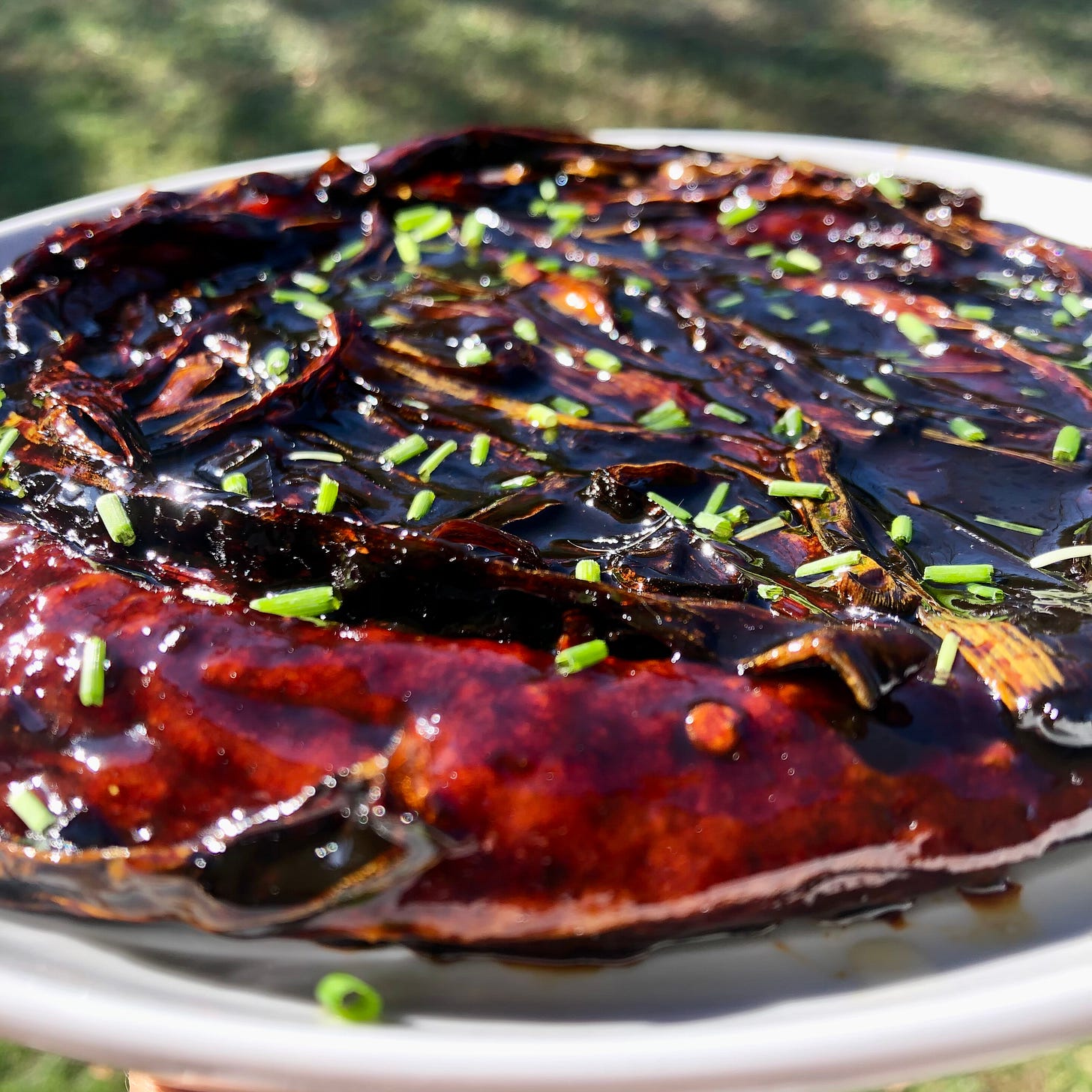Friday Food Finds
28: The Cookbook in Support of the United Nations: For People and Planet and a recipe for Leah Penniman's Soup Joumou
Today I have the pleasure of sharing a book with you that made it to the top of my intrigue list when I learned of it from the editor, Lauren Salkeld. Featuring not one, but 75 different recipe developers — from 75 different regions of the world — it highlights the chefs, farmers, indigenous peoples, and food justice advocates working to improve the global food system. It’s a book after my own heart, and I’m honored to be able to tell you a little about it and share a recipe from its visually stunning and generously informative pages before it comes out on November 1.
The Cookbook in Support of the United Nations: For People and Planet was a project led by Kitchen Connection Alliance (spearheaded by Earlene Cruz) in collaboration with the United Nations Department of Global Communications and the Food and Agriculture Organization of the United Nations. In 240 pages it engages home cooks in a holistic approach to food, cooking and culture, inviting them to advocate for change in the global food system from the comfort of their own kitchens.
From the sustainable paper it’s printed on to the inclusion of the carbon footprint1 of some of the recipes, the book leaves no opportunity to miss its critical point: our food (and general consumption) choices have an enormous impact on our planet. But there is hope and action in its pages as well. The chapters each illuminate one food-oriented solution to the climate crisis — like biodiversity gains, sustainable consumption, and food waste reduction. And each contributor’s story and recipe directly connects to a solution through individual impact and ingredient choice.
Although not all the ingredients and techniques in the book will be accessible to everyone, there is definitely something for everyone within its recipes. The introduction encourages cooks to be creative and adapt the recipes based on the ingredients that are available, especially when they can be sourced locally, sustainably and in season. Plus, some of the contributors do include ingredient swaps for those who might not be able to source certain foods, like breadnuts for example.
It’s hard not to want to read through this book cover to cover. There’s so much information to glean from it, and it includes so many enticing recipes. I personally, was immediately drawn to both the Scallion Tarte Tatin from Gaëlle Bonnieux and Claire Diquet, as well as the Erdäpfelgulasch (Austrian-Style Potato Goulash) from Ursula Schersch. They spoke to my French and Austrian identities. But the cultures and identities represented in the book are truly diverse.
The first recipe in the book (the one photographed on the cover) for Saffron Chicken with Freekeh is from Zahra Abdalla, an Iranian and Sudanese author/food blogger, and it looks and sounds incredibly appetizing. It’s a one-pot dish with a myriad of spices and flavors (including baharat, a 7-spice blend) that fuses Arabic and Iranian cultures together.
The On Sikil Bi Bu’ul (Black Bean Pipian) from Rosalia Chay Chuc, an indigenous chef and culinary advisor and teacher from the Mayan community, is another recipe that will surely make an appearance in my kitchen soon. A black bean stew flavored with pipian, a pepita-based sauce, and recado blanco, a roasted garlic paste, it’s a dish that seems downright comforting and moreish. It is also highlighted in the book as a meal that emits 96.18% less carbon than the average meal in the world’s highest emitting countries (the lowest carbon emitter of all the recipes in the book).
Today, I’m sharing with you the recipe for Soup Joumou2 from Leah Penniman, a Black Kreyol/peyizan, author, food justice activist, and co-founder of Soul Fire Farm in Petersburg, New York. This is the recipe that I wanted to cook the instant I came across it. I made it for a couple of friends, who have since requested more, and shared it with other friends who all proclaimed it delicious. Thus, I am incredibly thrilled and honored to be able to send out Leah’s recipe below:
Leah Penniman’s Soup Joumou
Republished from The Cookbook in Support of the United Nations: For People and Planet (ISBN: 9781641705844) with permission from the author, Kitchen Connection, and publisher, Familius
Leah Penniman is a Black Kreyol farmer/peyizan, author and food justice activist. She co-founded Soul Fire Farm with the mission to end racism in the food system and reclaim ancestral connection to the land through Afro-indigenous farming practices, farming training for Black and Brown people, a subsidized farm food distribution program and widespread organizing toward equity in the food system. Penniman’s farm grows 100 percent of the ingredients used in this heritage recipe for Soup Joumou, “the soup of independence,” that is made every new year to celebrate Haiti’s liberation from France. Yield: 8 servings Active time: 45 minutes Total time: 1 hour and 15 minutes Carbon emissions: 0.16 kg of carbon dioxide equivalent per serving Ingredients: 2 medium potatoes, chopped 2 carrots, peeled and chopped 2 leeks, chopped and well-washed 1 celery stalk, chopped 1 large onion, chopped 1 turnip, peeled and chopped 1⁄4 white cabbage, chopped 4 garlic cloves, crushed and peeled 6 tablespoons (90 ml) olive oil Salt and freshly ground black pepper 1 1⁄2 pounds (675 g) kabocha squash or Caribbean pumpkin, peeled and cubed 1 (13.5 fluid ounce / 398 ml) can coconut milk 1 cup (160 g) fresh or frozen sweet corn 1 Scotch bonnet chili or other spicy chili, finely chopped 1 tablespoon chopped fresh flat-leaf parsley leaves, plus more for serving 1 tablespoon fresh lime juice 2 whole cloves 1 teaspoon dried thyme 1 tablespoon honey or sweetener of your choice (optional) Directions: 1) Preheat the oven to 400°F (200°C). 2) On a sheet pan, toss the potatoes, carrots, leeks, celery, onion, turnip, cabbage and garlic with 4 tablespoons (60 ml) of the olive oil. Season with salt and pepper and roast, stirring occasionally, until golden and tender, about 40 minutes. 3) Meanwhile, on a second sheet pan, toss the squash with the remaining 2 tablespoons of olive oil. Season with salt and pepper and roast, stirring occasionally, until golden brown and tender, about 30 minutes. 4) In a blender or food processor, combine the roasted squash and coconut milk and blend until mostly smooth. Transfer to a large pot, add 8 cups (1.9 liters) of water and bring to a low boil. Add the roasted vegetables, along with the corn, Scotch bonnet chili, parsley, lime juice, cloves and thyme. Season with salt and pepper and add the honey, if using. Continue to gently boil for 15 to 20 minutes to blend the flavors. Divide among bowls, sprinkle with parsley and serve.
I sincerely hope you’ll try this recipe and that it encourages you to purchase The Cookbook in Support of the United Nations when it comes out on November 1. The recipe is nourishing in every way possible, and the cookbook is guaranteed to teach you something about food that you didn’t know before. Whether it’s a new ingredient, the history of a different culture, the flavors of another cuisine, or the innumerable ways we can repair our food system, there’s such tremendous promise in this book.
I’ll leave you with a quote from the introduction to the first chapter titled, “The Food System”:
Our goal as a society is to begin to intentionally question how our food choices impact our local and global food systems and our health. The answers lie in unadulterated nature, in the way that our ancestors ate and interacted with food as the sacred and nourishing vessel that it is. Re-evaluation starts with us—in our own kitchens and shopping baskets.
While we might not change the entire food system overnight, we can begin to move the needle in transformative ways. By talking to our local farmer or food purveyor about offering options that are more sustainable, we can drive demand. By encouraging curiosity, we can educate ourselves and one another. By cooking in new ways that are equally or more delicious and sharing that food, we can watch our health flourish. Together, we can. Together, we must.
Best,
Charlotte
P.S. If you liked this post, please give it a little ❤️ below. Feel free to comment too with any feedback (positive or negative). This supports more recognition of my work. Thanks!
The methodology for carbon footprint calculations is made clear and transparent on p. 137-138 in The Cookbook in Support of the United Nations. Briefly, the calculation is based on the sum of greenhouse gas emissions that result from the agricultural production of each ingredient in a recipe. This does not include the emissions that are related to the packaging, transportation, cooking methods, and disposal of food, as those processes are more variable.
Soup Joumou, or “the soup of independence” is enjoyed on January 1 every year to commemorate Haiti’s liberation from France in 1804, the first and only time a revolution of enslaved people successfully resulted in an independent nation.






This looks so tempting and delicious....it may very well be the next soup I prepare to enjoy on a cold day!!
Charlotte exposes me to food and ingredients and cookbooks I might otherwise not know about. Thank you!